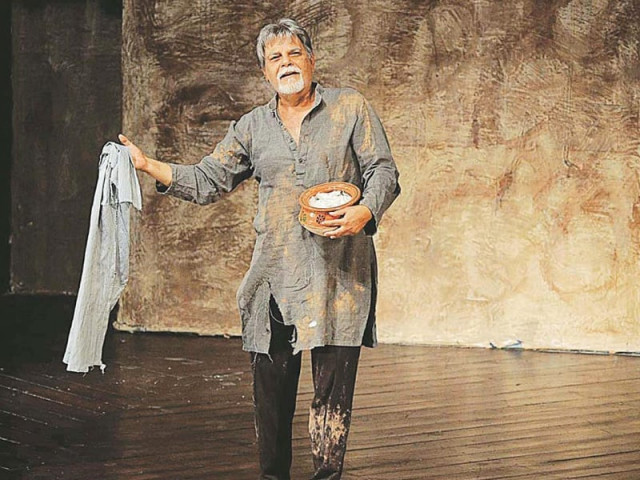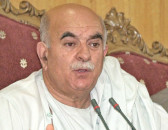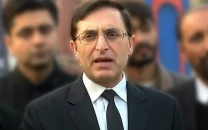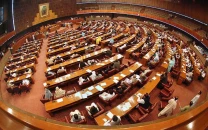In tribute performance, Shakeel’s message: Don’t go down that road
The actor performs solo in stage play ‘Us gali na jawin’.

In tribute performance, Shakeel’s message: Don’t go down that road
Perhaps one of the best ways to honour an actor is to ask him to perform his own tribute as a solo. Given Shakeel’s experience, this was only fitting for a man who has spent 47 years in film and television. The one-man show is, after all, considered drama’s toughest formats but also one in which the actor can exhibit his entire range.
For Shakeel, at the Arts Council on Friday night, this was the challenge. For 35 uninterrupted minutes, he delivered with pitch-perfect timing the serious script, ‘Us gali na jawin’ (Don’t go down that road) by Sarmad Sehbai, in an event that was commissioned by the Sindh culture department. By the end of the evening, the audience took to its feet and gave him a standing ovation.
Shakeel plays an elderly man, who appears to be down and out on his fate, made explicit by his costume: brown trousers, a ripped grey kurta and a white rag flung over his shoulder. The setting is an abandoned street and the only other ‘actors’ on stage are invisible pigeons who he has come to feed.
It becomes clear that the unnamed character has been driven mad by society and his experiences in this world. The empty stage drives home the point that he has been left alone as well, with only the pigeons to talk to. And such is the relationship that he has even named them. They are almost real people to him. “Why hasn’t Nikku come home yet,” he says at one point, almost like a worried parent, as the youngest pigeon fails to return to the coop. The subtext is clear: Nikku is the elusive peace in our world.
The pigeons are given advice on life in full conversations which allow Shakeel to touch on subjects like war, poverty, suicide, greed and pride. “Jang, jang, aur jang ke baad bhook aur nang,” he warns them. (War, war and more war only results in hunger and poverty).
At one point, he reminisces about a time when people were full of love, honesty and concern for each other. The only path to take is that of your ancestors, he tells the pigeons. “Jo maal yahan loota tha, wahaan lutta rahay hain,” he cries, referring to the corrupt who stole from the land and frittered it away abroad.
“Us gali na jawin,” the pigeons are warned. The message is hammered home. Don’t go down that road.
Sehbai’s script relied on double entendre, which is one of the delights of Urdu. “Jitna ooper jaatay jaao, zameen se naata chutt-ta jaata hai,” the old man tells the pigeons. The higher you fly, the less you remain in touch with the ground realities.

In the end, a poetic kicker as Shakeel scatters in the air, what is left: the feathers of his beloved pigeons.
Shakeel has performed this script many times before, but it was clear that he gives each appearance on stage everything he has got. The tears rolled down his cheeks at the end, and it was difficult to tell whether it was the old man or the actor behind the emotion.
“Words fail me — I really don’t know what to say, what not to say,” he said afterwards as he thanked the culture department and the audience. “My performance was a tribute to my colleague Talat Hussain, jo apna saani nahi rakhta.”
Playwright Fatima Surayya Bajia and dramatist-scriptwriter Haseena Moin were invited on stage to say a few words. Indeed, the auditorium was packed with the who’s who of theatre, television and film, including names such as Badar Khalil, Bushra Ansari, Anwar Maqsood, Sajid Hasan, Shahid Shafaat and Nimra Bucha.
Actor-producer Sania Saeed said she couldn’t believe Shakeel’s energy at his age. “I saw him on stage after a long time,” she told The Express Tribune. “Solo performances are difficult with nothing else to help you.” But it appears that Shakeel saheb needs no props to put on a good show.
Remember Uncle Urfi?
If Shakeel is associated with one role, that is Uncle Urfi, the Pakistani-Canadian who returns home in the 1970s drama series of the same title.
Born as Yusuf Kamal in Bhopal, India, in 1938, Shakeel migrated to Pakistan in 1952. After completing his education, he made his first appearance in the 1966 film Honehar, alongside legendary Waheed Murad. His first television play was “Naya Raasta,” written by Haseena Moin and aired in 1971. Since then, he has been in many memorable plays, including “Ankahi,” “Aangan tera,” and “Meri zaat zara-e-benishan.” He received the Pride of Performance in 1992.
Published in The Express Tribune, December 3rd, 2012.
Like Life & Style on Facebook and follow at @ETLifeandStyle for the latest in fashion, gossip, entertainment



















COMMENTS
Comments are moderated and generally will be posted if they are on-topic and not abusive.
For more information, please see our Comments FAQ